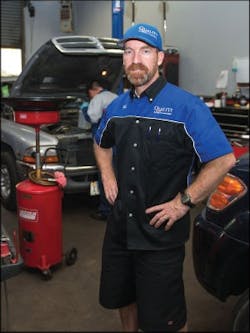Leadership styles can be as different as the people who use them. There is no perfect path to becoming a great leader—but there are sure-fire techniques to improving one’s leadership skills.
Three owners of some of the industry’s most successful shops shared the most impactful leadership lessons of their careers, and what others can learn from them.
Lesson #1
Share Your Vision
There are two pieces of paper taped to the wall of Quality Automotive and Smog’s lobby.
The first is a cutout of a pyramid, displaying the four key “team values” of the company. The second, just below the first, is a photograph of three smiling shop employees holding trophies.
To understand what makes Quality Automotive one of the nation’s most efficient shops, owner Bill Greeno says to look no further than that wall.
“We have common goals with a set way to get there,” Greeno, 42, says. “And, if we get there, we’re all going to benefit from it.”
The idea, Greeno explains, is creating a unified company vision that each and every employee buys into. It’s what Greeno did in his shop, and it’s what he says is the foundation that any shop owner’s leadership should be built on. For Quality Automotive, this vision is the driving force behind the company’s incredible sales numbers (which come out to roughly $55.56 per square foot per month), and it’s a reason that one leading industry consultant considers Greeno’s shop to be among the most profitable in the country.
“If you establish that common vision as a group, then you have traction,” he says. “You can make rules and guidelines in your shop all you want, and if you beat your guys over the head with it enough, hey, it might get through sooner or later. But, if they don’t have that vision backing it up, they don’t have the why, they’re never going to truly buy into what your business is all about. All they’ll ever see is rules.”
Greeno’s Hierarchy of Needs
Since he was 21, every position Greeno’s held has had the words “manager” or “supervisor” somewhere in the job title. Even his college degree was in business management.
And, regularly managing people 10 to 20 years his senior, Greeno realized early on that the simplest way to get people to “buy in” is to have them help to establish what they’re actually buying in to.
“You can get everyone together and come to an understanding on what we all want to get out of this business,” he says. “Then, you can say, ‘How do we as a group be as good as we want to be?’”
That formulates your vision, he says. And that’s what makes up the pyramid taped to the lobby wall. Each year, Greeno and his staff take President’s Day off and head to a local race track. They spend the morning discussing company goals and direction, and re-evaluate their mission statement.
For 2012–13, they came up with four items modeled after Maslow’s Hierarchy of Needs.
At the base of the Quality Automotive pyramid is “We are willing to challenge one another and be challenged by one another.” The next level is “Teamwork.” Then it’s “Results,” with “Fun/Enjoyment” topping the list.
The final point at the tip is where that trophy picture comes in. The staff spends the second half of President’s Day racing cars at the track; the top three finishers get trophies.
“People need to see that there’s something in it for them, that there’s something in it for everyone here, not just the owner,” he says. “If we all have that same vision, we’re all going to succeed together.”
Lesson #2
Confront Problems
Jeff Strausser never had much difficulty in managing his shop. Really, it’s almost second nature to him.
He first took the helm of a repair facility when he was 16, running the mechanical end of a gas station shop—a shop the actual owner was rarely at—in the early 1970s. He opened his own when he was 21, in a two-bay space at a Texaco station in 1976. And nearly 40 years worth of experience later, Strausser has built Jeff’s Automotive Service into a staple of the Easton, Pa., community.
Still, managing a shop is different than truly leading its employees.
“I could organize things well, and plan things, but I just never thought of myself as a good leader,” Strausser says. “I’d always read that some people were just born leaders, but it was one of those things, I just became determined to build myself into one.”
This was a couple years ago, and Stausser was tired of wearing too many hats in the shop, putting out fires employees routinely started due to a lack of processes.
And it all came down to one word: confrontation. He needed to confront himself about his inability to properly lead, and he needed to confront his employees about how they strayed from the company’s goals.
The point, Strausser says, isn’t to become a drill sergeant and rule the shop with an iron fist. Instead, it’s about keeping the “bus moving in the right direction,” and not letting your staff or yourself veer from that direction.
A Path to Success
Strausser first heard it in a three-day seminar given by renowned business speaker Richard Flint.
“And it just hit me square in the middle of the head: ‘If you don’t confront it, you validate it,’” Strausser says.
He looks at that phrase every day on a Post-It stuck to his computer screen.
“It’s just a great reminder of what I need to be doing,” he says.
And in the last two years, it’s come in handy.
In early 2011, Strausser took a hard look at how sales had been stagnant (yet solid) at $1.2 million for seven years. Confronting his business head-on, he didn’t feel they were doing enough to meet or exceed customer expectations, which should’ve been their overall goal.
He set out to change that.
“We were always busy, and we were turning people away,” he says. “What we were finding, though, is when we were telling people to come back tomorrow or Thursday or whatever, even if they made an appointment, they’d never show up.”
Strausser and his staff set out to keep that business from leaving his shop. The focus became on “making it work” for every customer that came in the door.
It meant getting his staff on board with the new philosophy—and everyone holding each other accountable. They had the systems in place to handle the higher work volume, and with renewed attention to the smaller details, Strausser knew they could become more efficient and get more work through the shop.
Sales jumped 50 percent that April, compared to the April before, based almost entirely off the team sticking to its renewed, strict procedures. And over the next year, they drastically grew sales. By the end of 2012, the shop did $1.4 million in total revenue. So far in 2013, they’re on pace for $1.9 million.
“If you let things go, that’s how they’ll always be done,” he says. “If you act on it, you’re going to create some change.”
Lesson #3
Be a ‘Navigator’
Everyone wants to grow—that’s the goal for any business, says John Cannon, owner of Cannon’s Automotive in La Porte, Ind. Whether it’s through expansion, through efficiency or through scale, shops need to move forward.
“The biggest thing is that we want to do it in a quality way, where you have good people around you doing the right kind of work,” Cannon says. “You always need to be changing, you always need to be adapting. That’s what we’ve always done. If you look at us today, we don’t look a whole lot like what we did five years ago. And it would be the same for five years before that, and five years before that.”
One thing has remained constant, though: the shop’s continued success, and the people who have been a part of it. Cannon has two employees who have been with him for more than 30 years; another technician is 27 years into his tenure with the company.
Since opening the doors in 1971, Cannon has created a sustainable business that has changed and adapted appropriately with the times—and he feels that’s what a leader of any shop needs to do.
“A leader, especially today, has to be a good navigator,” he says. “He has to be able to see what’s coming down the road, far ahead of everybody else. It’s easy to get trapped in the day-to-day, but you need to be able to look forward to be able to push your business forward. And you can’t be afraid of change, and you can’t be afraid to grow.”
A Changing Landscape
More than 30 years after opening his first gas-station shop, Cannon broke away from the gasoline business in 2005, selling the pump station that had been associated with his shop for decades.
It was a gradual change, one that came with regular expansions to the repair side of the building in the previous decade. And it’s one that allowed the business to really flourish and increase in profitability.
“Gasoline just wasn’t heading in the right direction for me,” he says. “It was getting too expensive to keep up, and our reputation and work wasn’t really tied to it.”
Meanwhile, the shop had made some subtle—and other not-so-subtle—tweaks to the way it would operate, adapting for what Cannon saw as the modern needs of customers.
“You need to educate customers today, and you need to give that different level of service,” he says. “It’s more about maintenance than repair, and with that, you need to keep giving reasons for them to come back again and again.”
The shop answers phones differently. They greet customers differently. The staff does more skills training. It’s about all the little things that add up, he says, like how last winter they started keeping a “drive-through” space clear and clean in the shop to deliver vehicles to customers, avoiding the harsh outdoors of Indiana winters.
“You have to welcome change with open arms, because if you don’t, in business today, no matter the business you’re in, you’re not going to be around long,” he says. “That’s just a fact of any business today.”



